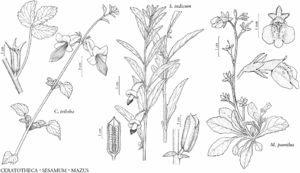Difference between revisions of "Mazaceae"
FNA>Volume Importer |
FNA>Volume Importer |
||
| Line 42: | Line 42: | ||
|publication year= | |publication year= | ||
|special status= | |special status= | ||
| − | |source xml=https://jpend@bitbucket.org/aafc-mbb/fna-data-curation.git/src/ | + | |source xml=https://jpend@bitbucket.org/aafc-mbb/fna-data-curation.git/src/f50eec43f223ca0e34566be0b046453a0960e173/coarse_grained_fna_xml/V17/V17_1257.xml |
}}<!-- | }}<!-- | ||
-->[[Category:Treatment]] | -->[[Category:Treatment]] | ||
Revision as of 20:03, 16 December 2019
Herbs, annual or perennial, not fleshy, autotrophic. Stems horizontal to ascending or erect, 4-angled. Leaves usually cauline and basal [basal only], opposite, simple; stipules absent; petiole present or absent; blade not fleshy, not leathery, margins entire, toothed, or divided. Inflorescences scapose or terminal racemes. Flowers bisexual, perianth and androecium hypogynous; sepals 5, proximally connate, calyx radially symmetric; petals 5, proximally connate, corolla bilaterally symmetric, bilabiate, tubular; stamens 4, adnate to corolla throat, didynamous, staminode 0; pistil 1, 2-carpellate, ovary superior, 2-locular, placentation axile; ovules anatropous, unitegmic, tenuinucellate; style 1; stigma 1, capitate and slightly 2-lobed. Fruits capsules, dehiscence loculicidal [fleshy, berrylike (Lancea)]. Seeds 20–40, yellowish brown, ellipsoid; embryo straight, endosperm sparse.
Distribution
e Asia, Australia, introduced also in Central America, South America, Europe, Africa.
Discussion
Genera 3, species ca. 36 (1 genus, 2 species in the flora).
Mazaceae, which includes Dodartia Linnaeus, Lancea Hooker f. & Thomson, and Mazus, was described in 2011 to accommodate these genera traditionally allied with Mimulus in the Scrophulariaceae. P. M. Beardsley and R. G. Olmstead (2002) suggested that the three genera belonged in a more broadly circumscribed Phrymaceae. Two subfamilies were proposed, but not published, to accommodate the alignment of Lancea and Mazus in a clade sister to the rest of the Phrymaceae. D. C. Albach et al. (2009) suggested that, on the basis of monophyly, Lancea and Mazus could not be included in the Phrymaceae or any other then-circumscribed family.
Selected References
None.
